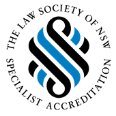Best Trusts Lawyers in Parramatta
Share your needs with us, get contacted by law firms.
Free. Takes 2 min.
List of the best lawyers in Parramatta, Australia

About Trusts Law in Parramatta, Australia:
Trusts in Parramatta, Australia are legal arrangements where assets are held by one party for the benefit of another. Trusts are commonly used for estate planning, protecting assets, and charitable purposes. Trusts can be complex legal entities, so seeking legal advice is often recommended when setting up or managing a trust.
Why You May Need a Lawyer:
You may need a lawyer for Trusts in Parramatta, Australia in situations such as setting up a trust, managing trust assets, resolving disputes among beneficiaries, interpreting trust documents, and ensuring compliance with legal requirements. A lawyer can provide guidance on the best trust structure for your specific needs and help navigate any legal complexities that may arise.
Local Laws Overview:
In Parramatta, Australia, the laws governing trusts are primarily based on the Trustee Act 1925 (NSW) and the Trustee Act 1962. These laws outline the duties and responsibilities of trustees, the rights of beneficiaries, and the rules governing trust administration. It is important to consult with a lawyer well-versed in local trust laws to ensure compliance and protect your interests.
Frequently Asked Questions:
Q: What is a trust?
A trust is a legal arrangement where one party (the trustee) holds assets for the benefit of another party (the beneficiary).
Q: What are the different types of trusts?
Common types of trusts include discretionary trusts, unit trusts, testamentary trusts, and charitable trusts.
Q: How do I set up a trust in Parramatta, Australia?
To set up a trust, you will need to create a trust deed outlining the terms of the trust, appoint a trustee, and transfer assets into the trust.
Q: What are the duties of a trustee?
Trustees have a duty to act in the best interest of the beneficiaries, manage trust assets prudently, avoid conflicts of interest, and keep accurate records.
Q: Can a trust be revoked or amended?
Depending on the terms of the trust deed, some trusts can be revoked or amended. It is important to seek legal advice before making any changes to a trust.
Q: How are trust assets distributed to beneficiaries?
Trust assets are distributed to beneficiaries according to the terms of the trust deed. The trustee has a legal obligation to follow these terms when distributing assets.
Q: Can a trustee be removed?
In certain circumstances, a trustee can be removed by the court or by the beneficiaries of the trust if they are not fulfilling their duties.
Q: What happens if a beneficiary disputes a trust?
If a beneficiary disputes a trust, they can seek legal recourse through the courts to resolve the dispute and protect their interests.
Q: How can I ensure my trust is legally valid?
To ensure your trust is legally valid, it is important to have a well-drafted trust deed, appoint a competent trustee, and comply with all legal requirements for trust creation.
Q: Do I need a lawyer to manage my trust?
While it is not legally required to have a lawyer manage your trust, seeking legal advice can help avoid potential pitfalls and ensure that your trust is properly managed according to the law.
Additional Resources:
For more information on Trusts in Parramatta, Australia, you can visit the Law Society of New South Wales website or consult the NSW Trustee & Guardian for guidance on trust administration.
Next Steps:
If you are in need of legal assistance for Trusts in Parramatta, Australia, it is advisable to schedule a consultation with a qualified trust lawyer who can provide personalized advice based on your specific circumstances.
Lawzana helps you find the best lawyers and law firms in Parramatta through a curated and pre-screened list of qualified legal professionals. Our platform offers rankings and detailed profiles of attorneys and law firms, allowing you to compare based on practice areas, including Trusts, experience, and client feedback.
Each profile includes a description of the firm's areas of practice, client reviews, team members and partners, year of establishment, spoken languages, office locations, contact information, social media presence, and any published articles or resources. Most firms on our platform speak English and are experienced in both local and international legal matters.
Get a quote from top-rated law firms in Parramatta, Australia — quickly, securely, and without unnecessary hassle.
Disclaimer:
The information provided on this page is for general informational purposes only and does not constitute legal advice. While we strive to ensure the accuracy and relevance of the content, legal information may change over time, and interpretations of the law can vary. You should always consult with a qualified legal professional for advice specific to your situation.
We disclaim all liability for actions taken or not taken based on the content of this page. If you believe any information is incorrect or outdated, please contact us, and we will review and update it where appropriate.








